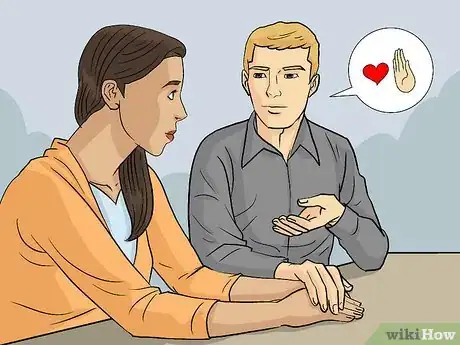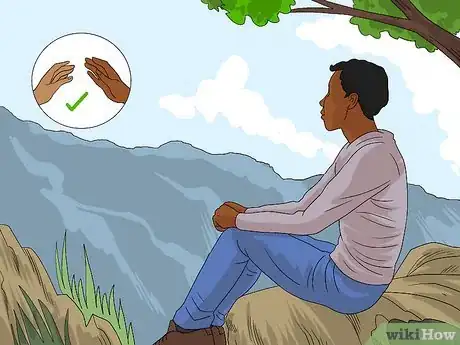This article was co-authored by Jason Polk, LCSW, LAC and by wikiHow staff writer, Kira Jan. Jason Polk is a Relationship Counselor and the Owner of Colorado Relationship Recovery. With over 12 years of experience as a therapist, he specializes in helping couples build healthy and thriving relationships through counseling. Jason holds an MSW from Newman University, Colorado Springs. He is also a Level II Psychobiological Approach to Couple Therapy (PACT) therapist, Healing Our Core Issues (HOCII) Certified therapist, and has training in Relational Life Therapy (RLT).
There are 9 references cited in this article, which can be found at the bottom of the page.
This article has been viewed 24,530 times.
When you’re dealing with relationship doubts or recurring arguments, it’s normal to want to put your relationship on pause. But how do you make sure that a temporary break doesn’t become a permanent break up? We know navigating a break and bringing the idea up to your partner isn’t easy, but we’re here to walk you through it. We’ve put together all the do’s and don’ts of taking a step back so you can get space and clarity without breaking up.
Steps
Take a step back if you want a fresh perspective.
-
When should you take a break? If you’re looking to gain clarity in your relationship and have time to reconnect with yourself, pausing your relationship could be a great move. Identifying your own motivations will help you reassure your partner that this isn’t a breakup—you’re just asking for time to work through your own thoughts. Here are a few reasons why taking a break could help your relationship:[1] X Research source
- You can both cool down if you’ve been arguing.
- You have time to think about what you want and need in a relationship.
- You get enough distance to recognize your mistakes and pinpoint how you can be a better partner.
- You get the chance to work through any doubts about the relationship.
Set aside time to talk in person.
-
Pick a time when you’re both calm, rather than in the heat of the moment. Talking about a break can be a stressful conversation. By setting up a time to talk in advance, your partner won’t feel blindsided. Before the conversation, you can even check in by asking, “Is this still a good time to talk?” It’ll be much easier to have a productive conversation when you’re not rushing to get out the door or stressed after a long day at work.[2] X Trustworthy Source Understood Nonprofit organization dedicated to resources and support to people with thinking differences, such as ADHD or dyslexia Go to source
- “Tomorrow night, could we talk about something that’s been on my mind? I always feel better after we talk things through together.”
- “I know things haven’t been easy lately, but I’d love to talk about some potential solutions. Can we talk after breakfast?”
Bring up how the break will benefit you both.
-
Make the conversation easier by focusing on hope for the future. Use “I feel” statements to describe how you see your relationship now. Then, suggest taking a break by talking about how space could ultimately strengthen your relationship. Try to agree on a common goal or meaning behind the break—whether that’s working through doubts, cooling down from arguments, or reconnecting with personal goals.[3] X Research source
- “I’ve felt like we’re moving pretty fast lately. I’d like to take a step back from our relationship so we can slow things down. Would you be willing to try that?”
- “I feel so grateful that you’re a part of my life. I want to make this work. Taking a break might help us get distance from the fights we’ve been having recently. How do you feel about that?”
- Focus on hope for the future of your relationship rather than venting or listing out complaints about your current situation.
Pick a date when you’ll come back together.
-
Setting a timeline makes it clear that you do want to get back together. Every couple’s timeline for a break might look a little different. If you’ve been together for years, it might make sense to take a month-long break. But if you’ve only been dating for a few months, you could try taking a step back for a shorter time period, like 1-2 weeks.[4] X Research source
- “Does 2 weeks sound like a reasonable time for us to take a step back? After that, we can sit down again and talk about what we both need.”
- “How would you feel if we took a break for a month to work on ourselves? Then, we’ll come back together and talk about how we can make our relationship stronger.”
Set boundaries for your time apart.
-
Clear guidelines prevent a break from becoming a breakup. For instance, if you’re in an exclusive relationship, you might agree not to date or sleep with other people during the break. Treating a break as a time to “test the waters” and date other people can lead to hurt feelings and unresolved tension.[5] X Research source
- You might also decide whether you want to tell your family and friends about the break or keep it private.
- You can also set boundaries on communicating with exes. Your partner might be hurt or offended if you reach out to an ex while you’re on break.
- Be clear about the “rules” for the break. For example, you could say, “I don’t want to use this time to see other people. I just want to gain more clarity about where we’re at.”
Agree on how often you’ll talk to each other.
-
Give each other space to reflect and grow. Some couples might opt not to call, text, or talk during the break. If completely cutting off contact feels too close to a breakup, you can find a middle ground. For instance, you might want to stay connected by living in separate places but checking in once a week.[6] X Research source By giving yourself distance, you’ll be able to reflect on the relationship, gain a new perspective, and even miss your partner.
- Set a clear expectation for communication by saying something like, “You can always reach out to me if there’s an emergency, but I think it’s best if we don’t talk while we’re apart.”
- If cutting off communication isn’t possible (especially in a case where you’re co-parenting), set boundaries. For instance, “I know we’ll still see each other when you come to see Riley, but I think it’s better if we don’t text or call.”
Reconnect with yourself.
-
Use the break to explore your hobbies, career goals, and relationships. What have you been putting off? What makes you happy? How do you feel without your partner? Taking time to live your life as an individual can help you figure out the question: “Are we actually right for each other?” You might realize you miss what your partner adds to your life, or you might realize that you enjoy life on your own.[7] X Research source
Ask yourself what you need from your relationship.
-
Taking a step back can help you pinpoint what you can improve. Try to identify common issues that pop up in your relationship—big or small. Dig deep and see if you can find a broader unmet need behind that issue.[8] X Research source For instance, if you get annoyed when your partner doesn’t answer your texts, that annoyance might stem from feeling like you’re not a priority to your partner.
- Relationship conflicts tend to fall into 6 categories: lack of affection or attention, jealousy or infidelity, chores/household responsibilities, sex, control, and future/financial goals.[9] X Research source
- If something specific triggered your desire to take a break, try journaling about it. Write down what happened, how you felt about it, and what you would’ve liked to have happened instead.
Separate realistic needs from unrealistic expectations.
-
You and your partner won’t be able to meet 100% of each others’ needs. You’re both unique, imperfect people. Natural differences and quirks mean that every relationship will have its ups and downs. Open yourself up to compromise and ask, “What do I value most in a partner and in a relationship?” With good communication, you can both work towards a balance of what you want.[10] X Research source
- Identify places in your relationship where you think your partner “should” act differently. Then, ask yourself, “Is my expectation realistic? Where does that belief that they need to change come from?”
- Are you putting enough effort into your relationship or placing an unfair burden on them?
- Can you put yourself in your partner’s shoes and see their perspective?
Get back together to talk about changes you can make.
-
Create a plan of action for a healthier, happier relationship. Focus on problem-solving for 1-2 main issues in your relationship. Describe how you feel about the problem after getting time and space away from the relationship. Then, ask open-ended questions like “What would make this better?” or “Why do you think this happens?”[11] X Research source
- When it’s your partner’s turn to speak, show them you’re really listening. Ask clarifying questions like, “It sounds like you feel hurt when I don’t answer your calls. Is that right?”
- Try to come up with compromises. For instance, “I like having time to decompress after work. I love talking to you every night, but could we plan to call after 8PM?”
You Might Also Like

 Signs Your Ex Will Eventually Come Back
Signs Your Ex Will Eventually Come Back


 What Are the Bases in a Relationship? Defining the Baseball-Sex Metaphor
What Are the Bases in a Relationship? Defining the Baseball-Sex Metaphor
 The Top Emojis a Girl Will Use if She Likes You
The Top Emojis a Girl Will Use if She Likes You
 How to Tell if Your Girlfriend Is Horny: 12 Signs She's Turned On
How to Tell if Your Girlfriend Is Horny: 12 Signs She's Turned On
 What to Do When Your Girlfriend Is Mad at You (10+ Steps to Take)
What to Do When Your Girlfriend Is Mad at You (10+ Steps to Take)
 12+ Texts to Send Your Girlfriend After a Fight: Apologies & More
12+ Texts to Send Your Girlfriend After a Fight: Apologies & More
 How to Have Phone Sex with Your Girlfriend
How to Have Phone Sex with Your Girlfriend

 33 Sweet & Romantic Apology Messages for Your Love
33 Sweet & Romantic Apology Messages for Your Love
 12 Ways to Break a Narcissist's Heart
12 Ways to Break a Narcissist's Heart

References
- ↑ https://www.psychologytoday.com/us/blog/valley-girl-brain/201404/does-your-relationship-need-break
- ↑ https://www.understood.org/articles/en/9-tips-for-having-difficult-conversations-with-your-partner
- ↑ https://www.cbc.ca/life/culture/should-you-take-a-break-from-your-relationship-a-relationship-counsellor-sounds-in-on-when-and-how-1.5156555
- ↑ https://www.psychologytoday.com/us/blog/the-mysteries-love/201601/is-the-difference-between-breakup-and-break
- ↑ https://www.psychologytoday.com/us/blog/the-mysteries-love/201601/is-the-difference-between-breakup-and-break
- ↑ https://www.cbc.ca/life/culture/should-you-take-a-break-from-your-relationship-a-relationship-counsellor-sounds-in-on-when-and-how-1.5156555
- ↑ https://www.betterhelp.com/advice/how-to/how-to-give-someone-space-and-why-its-important/
- ↑ https://www.loveisrespect.org/resources/getting-what-you-want-need-from-your-relationship/
- ↑ https://www.psychologytoday.com/us/blog/experimentations/201912/30-core-disagreements-couples-encounter
About This Article























































